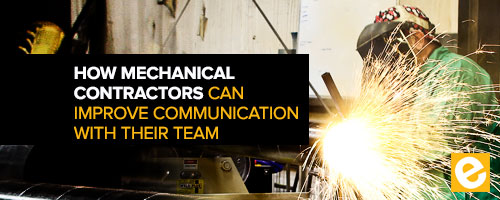
How Mechanical Contractors Can Improve Communication With Their Team
Communication is key to a successful and painless project; however, it’s a skill that not everyone has. For mechanical contractors that can mean more time and money on projects that should’ve been easy. With construction, the open communication of plans, ideas, and concerns keeps projects on time and on budget. In order to keep projects running smoothly here are some tips and techniques mechanical contractors can use to improve communication with their team.
Table of Contents
Why Communication is Important for Mechanical Contractors
Mechanical contractors are responsible for the mechanical needs of a construction project. From heating, air conditioning, piping, plumbing, refrigeration and more, the mechanical contractor is responsible for the comfort and temperature of a building. Another part of a mechanical contractor’s job is system maintenance after installation. From the beginning, communication is crucial for a mechanical contractor to successfully complete and maintain any project.
Since mechanical contractors are responsible for the technical workings of a buildings, they need to communicate with project owners and other contractors to best complete the project. Like many projects in construction, delays result from a small group of common problems. Incomplete or inaccurate drawings, misused language, interpretations, and unclear directions are all common causes of miscommunication that result in larger problems. Since communication is a skill, mechanical contractors can apply these tips and tricks to improve communication with the team.

Tips and Tricks for Improving Communication
1. Establishing a Clear Chain of Command
An easy way mechanical contractors can improve communication is by establishing a clear chain of command. This ensures that all employees from field workers to project managers know who to talk to and who will give orders. For example, if a field worker notices something wrong with a diagram they know who to tell. And if the scope of work changes, the project manager knows who to talk to.
2. Clarity, Avoiding Confusion
If one of the biggest issues is miscommunication and inaccurate or incomplete drawings then clarifying is an easy fix. By asking for clarification on drawings, measurements, and more mechanical contractors ensure they have the right information. Clarity also extends to any written or spoken communication. Avoiding excessive jargon and slang, as well as keeping all communication simple, direct and readable cuts back on miscommunication. That clarity translates down the chain of command as well.
3. Communication Timelines
Mechanical contractors need to touch base with a project’s chain of command at different rates. A project manager might want weekly updates, while an owner might want updates every other week, and workers should be updated daily. These rates of communication are important to keep to ensure everyone is up-to-date and the project is on target.
4. Communication Records
In any construction work, it’s important to keep records of all communication. Not only is it helpful in case you have to go to court, but it can be helpful on projects. It gives you a central location that you can check for discrepancies, timelines, and help prevent future miscommunication. With a communication record you will know what to change to prevent communication. Mechanical contractors can use this to improve how they communicate and prevent future issues.
5. Effective Listening
An easy way to increase clarity and understanding is through effective listening. The principles of effective listening are fairly simple. It asks people to give speakers their full attention before asking questions or making comments. Everyone, including mechanical contractors, can benefit from effective listening because it solves many problems before they arise. Since people aren’t thinking about what they’re going to say next they’re focused on what the speaker says. It also ensures that people will ask clarifying questions rather than repetitive questions.
6. Seek Feedback
Effective communication is a two-way street and should be treated like one. Open communication between you and your team can decrease errors and alert you to potential problems. But don’t limit feedback to project errors. Feedback on the flow of information, timelines, and other business and personnel-related suggestions and comments can benefit the business.
When soliciting feedback it’s important to follow up with questions or restate what was said. This assures the other person or people that you were listening and ensures that there both parties are understood. Which overall improves communication between mechanical contractors and their team.